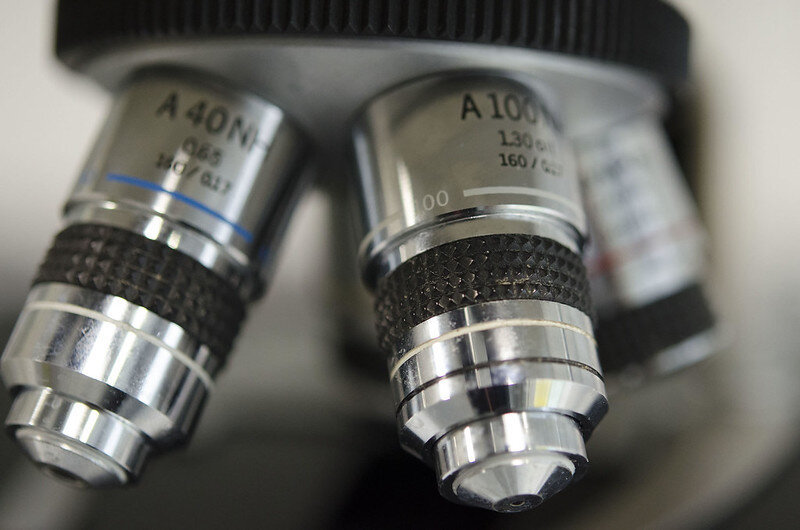Have you ever looked at something under a powerful microscope? When you do, what you were looking at disappears, and a whole new world opens up before you. Color and shape is gone. What looked and felt like a smooth surface in the outside world now appears rough and jagged.
Many of us have been taught to apply a microscope to our actions. And our thoughts. And our feelings. Our teachers took this idea from 2 Corinthians 13:5: "Examine yourselves, to see whether you are in the faith. Test yourselves. Or do you not realize this about yourselves, that Jesus Christ is in you?—unless indeed you fail to meet the test!"
And so examine we did. Now, lots of people look at their lives and give themselves a pass, but we wouldn't be so easy on ourselves, would we? If we were really godly, we'd would turn up the magnification a bit on that microscope. And what we saw there... Well, it's horrifying.
Paul didn't advocate for morbid introspection. But it's what godly people do, right? If anyone bothered to point that out to those of us on that path, we would have thought (though never said) something like, "Then we must try to be more spiritual than Paul!"
We'd tie various stakes to these examinations. For the Calvinists among us, there was concern that despite all prior examination having passed, there may be discovered that thing that meant you were never saved to begin with. Others were burdened with the possibility of losing the salvation they'd already possessed.
And it's not so much about our actions in themselves, as it is the comfort level we have. We selectively focus our microscope, don't we? We are somehow comfortable enough to zoom in on some things and be temporarily horrified. Other things, we are blind to - the microscope is out of focus, or we keep it out of the viewing area.
Sooner or later, we realize: there is always more sin in our lives. No matter what we've discovered, no matter what we've taken the time to ferret out and attempt to destroy, no matter how morbid our introspection: there is always more. We discover that, subconsciously, we've been maintaining a certain comfort level about ourselves.
We have an inner filter we train for that question of assurance. You can't be saved and do <x>. Whether we frontload or backload the gospel with that doesn't matter - <x> wouldn't bother us at all but for what feels like it will get us in trouble.
Discipleship programs are intended as an impetus to true godliness. For many, though, they serve as a training program for that inner filter - to adjust our tolerance. What's the difference? Well, it boils down to whether we approach the Christian life as sin management versus something else. Most would describe that something else as "relationship". After all, that's how we're taught in evangelism class - present the gospel as religion vs relationship.
But we used that microscope and zoomed way in. Somewhere along the line, our eyes darted across the part of us that is relationship. And what we saw there... Well, it's horrifying. We wondered why we weren't hearing God's voice clearly. We wondered why the joy just wasn't there most of the time. We wondered why, despite our best efforts, we felt like second-class Christians. And now we knew.
Deep inside, we'd known for some time that our relational substance was broken. But now we saw it for ourselves, in all of its splendor, and no tolerance filter adjustment would return comfort.
That's why many of us default to the sin-management paradigm. If we break one hand, we learn to write with the other. So when relationship (or relationality) is broken, we shift to the other so naturally, don't we? We find ourselves keeping score - how many people we've helped, how many good deeds done. All of it distracts from the gospel.
No one is immune from this path. If we see someone seriously following God but stuck in a pattern of sin management, we've almost certainly discovered a soul in the fog. I have seen pastors wandering the fog in this way. I've seen missionaries as well. Some are in their chosen profession because they are here.
So what for those of us weak in relationships? What is the material and practice of being Christian if we don't have that dimension working? Well, as I said, natural instinct is to shift to another paradigm. But really, we need to lean in to that weakness. Surround ourselves with people who have relationship working, and allow that to permeate us over time.
Broken relationship trumps sin management.
References:
Permeation of souls: Plass, Richard, and James Cofield. The Relational Soul: Moving from False Self to Deep Connection. Ivp Books, 2014.
"microscope" by liverpoolhls is licensed under CC BY 2.0

Leave a comment in response to the post: